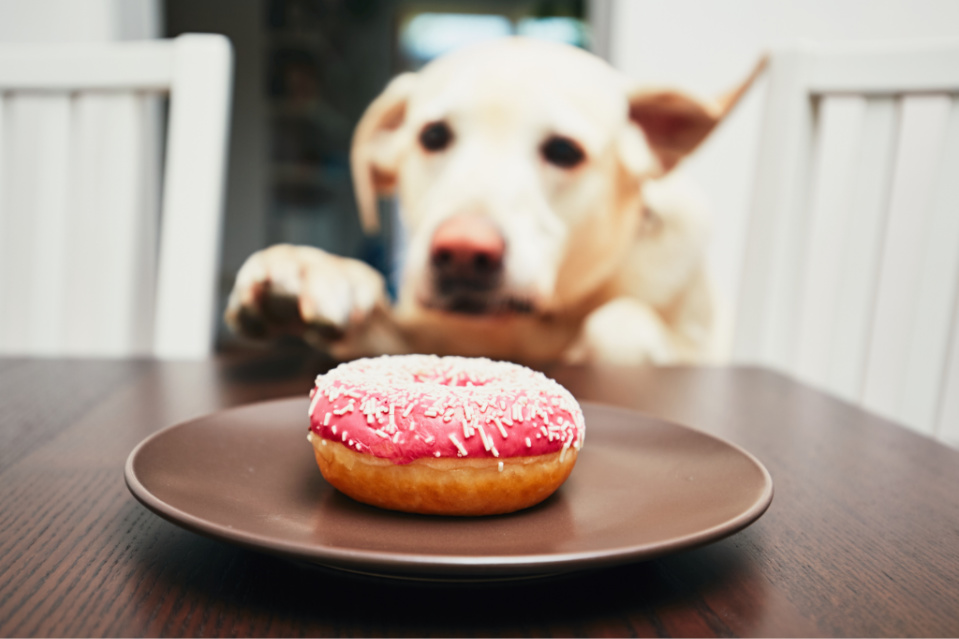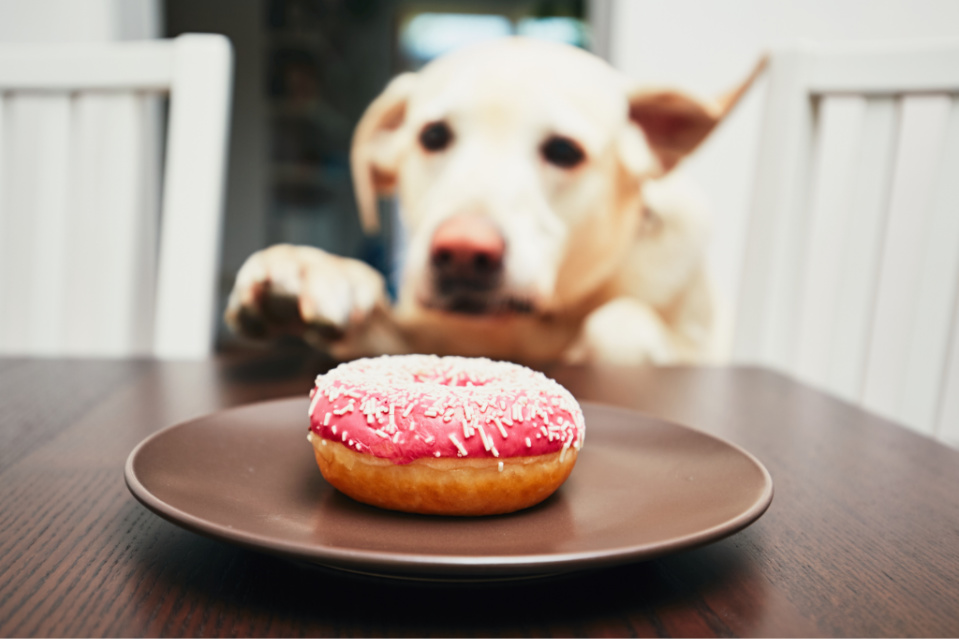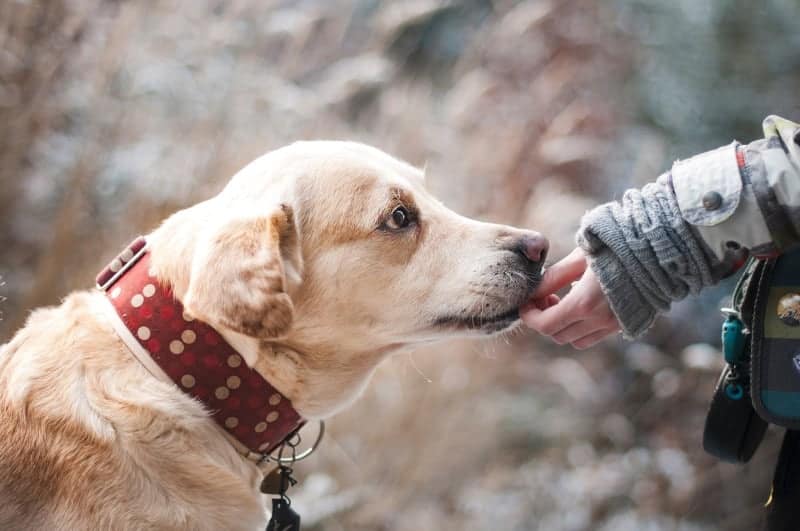Labrador Retrievers are notorious for always being hungry.
You could feed them what their body needs, and then the next thing you know, they’re already begging for more! Many Labrador owners probably relate to this and think about what they can do to satisfy their Lab’s hunger.
The first thing you should know is that it might not be your fault.
Sometimes, a Labrador’s large appetite has nothing to do with training (or the lack of it) and has everything to do with their genetic makeup.
The rest of this article will go further into what causes your Labrador to be always hungry and what you can do about it.
Why are Labrador always hungry?
Before anything else, you should know that there are plenty of reasons why your Lab seems to have an insatiable appetite.
Biology
Part of the reason why your Labrador is hungry all the time could be their DNA.
According to a paper from the University of Cambridge, there is apparently a certain gene mutation that interferes with a dog’s ability to tell when they are already full.
The effect of this is literally that the dog will have trouble telling when to stop eating. Clearly, this is problematic, especially in Labradors, which are prone to obesity.
What happens in some Labradors is that the PCOM mutation significantly increases their chances of gaining more weight and to be more food-motivated. So, the more mutations this gene has, the more likely they are to be overweight.
The study found that for every deleted or mutated allele in the gene, there was about a 1.9kg effect in the weight.
The link between obesity and this gene mutation is directly proportional. Labradors may become obese simply because of this gene mutation.
In fact, according to the study, about a quarter (23%) of Labrador Retrievers have at least one PCOM mutation.
Funnily enough, the gene was more present in Labradors who work as service or assistance dogs (at 45%). The researchers highlighted this particular finding because it could be possible that Labradors are so easy to train and cooperative because of their food-motivated behavior.
Training

But, take note that not even 75% of Labs have that gene mutation. It could be very well just your training or lack of it when it comes to food and eating.
We all know that Labradors can be charming and easily trick us into giving them what they want.
This is especially true in terms of giving treats as rewards for positive behavior or when they beg during mealtimes. Over time, a Labrador’s appetite could increase due to the tiny increments of food increase.
If training is the case, then that’s a fix you can definitely achieve. Below, you will find tips and tricks to start properly training your dog in terms of food.
Underlying medical issue
Apart from the two mentioned above, another reason why your Labrador is always hungry may also because of an underlying medical issue you might not be aware of.
There are some medical problems that will result in your Lab wanting to eat more than they should. In these cases, a check-up with your vet should be in order.
For example, canine diabetes is a common cause of an increased appetite for dogs. When a dog has diabetes, the body will not process sugar the same way, and insulin levels could be a problem. These bodily changes can directly impact appetite in dogs.
Another cause for appetite increase is gastrointestinal problems. Although there are different types and manifestations of these problems, it is a possibility that a dog can increase its appetite due to the poor absorption of food. A common sign of this is weight gain or loss coupled with an increased appetite.
Parasites could also be a potential issue. When your dog is robbed of the nutrients that their body needs, they may want to make up for it by eating more.
These are only a couple of examples showing how medical issues can affect appetite. In reality, there are plenty more, ranging from tumors to pancreatic issues.
If you feel like an underlying medical problem the reason why your Labrador is always hungry, go visit your vet.
To err on the side of caution, it’s best to do it whenever there are odd changes in your dog’s behavior. Early detection of illnesses could make all the difference in the world.
Training your dog to eat less

Since you are the one who controls your Labrador’s eating patterns, the burden of responsibility falls on you. Even if there are no problems so far with your Lab’s eating, you should be cautious because Labradors have a tendency to become obese.
If you take a look at this study of Australian dogs, nearly 35% of them were found to be overweight. Those statistics are probably even more skewed for Labradors, given their propensity to eat more and become obese in the long run.
Training your Labrador to eat proportionately takes time and dedication. A recurring problem may be due to their incessant begging during your mealtimes or trying to get more food during their mealtimes.
The first thing you can do to regulate your Labrador’s eating is to examine what type of food and how much do they need to consume in order to stay healthy. Consult your vet for professional advice on this matter.
The next step you should take is to think about what changes to make. If you find that you are giving your Lab just the right amount, then you can just roll with that. However, you might still want to incorporate healthier options.
If needed, you can cut back on food during mealtimes so you can see what changes you should make. Try cutting back by a quarter per meal and observe how that works out.
The first item to cut out of your Lab’s diet should be their treats. Generally, they don’t really “need” treats, as many treats lack nutritional value.
However, you have the option of giving your Lab healthy treats, such as carrots or apples. Fruits and veggies are fun and healthy alternatives to commercial treats.
If your problem is your Lab begging during mealtimes, you have to train them not to do it anymore.
A good way to go about it is to reward not begging and ignoring their whining or negative behavior. Soon, they will understand that there is no point in begging for more food, as you aren’t likely to give them some anyway.
Keep in mind that being consistent with this practice is the most important thing of all. Don’t give in to their adorable faces and just keep pushing through until they no longer keep asking for more.
It’s also imperative that you talk to your housemates so they can also participate in training your Lab.
All in all
Ultimately, the point of it all is to keep your Lab healthy and happy, not to deprive them of every novelty.
Always remember to toe the line between moderation and starving your dog, and you should be good to go.
Make it a positive experience for your Lab, and it will improve their health and extend their lifespan.







